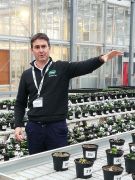Ban on peat? Give us time
The Government is due to start a consultation for the phasing out of peat in UK horticulture. The argument that the use of peat for growing plants should be eradicated has been accepted by Government and is most likely to happen.
Some lobbyists want a quick, total ban. The industry argues that a blanket ban would be worse for the environment than a managed phasing out which would also be better for gardeners. However, there is more that can be done quickly.
There are problems to be overcome.
- Current alternative substrates such as coir and woodchip have their own carbon footprint.
- Government subsidies diverting woodchip for heating has limited supply of and increased prices of one of the main substitutes.
- There are still some horticultural applications where no viable alternative to peat has been developed.
- Many commercial growers are not ready for the change in growing methods that will be required.
- The gardening public has yet to understand that the switch from peat and the loss of other staples for gardeners such as Glyphosate (Round-Up) require a different, more proactive way of gardening.
- Peat consumption could be cut significantly now, but gardeners are wasting peat and its relatively scarce alternatives unnecessarily through lack of understanding.
Limited supply of alternatives to peat
The industry has made significant progress in developing alternatives to peat. However, there is not the volume of alternatives such as woodchip and coir to replace peat entirely. This is partly because Government subsidies have diverted wood biproducts towards heating.
Woodchip and coir are not perfect substitutes and carry their own environmental cost, something that is highlighted by the Responsible Sourcing Scheme. From the Spring most compost suppliers will include a gauge on their bags that shows the overall environmental score for the contents. Consumers will be able to make a more informed choice.
Legislation blocking new products
There are other waste products, especially from the food sector, that show considerable promise as an alternative compost. However current legislation prevents their development.
The HTA is pressing government for a change in legislation to allow more waste products to be researched and to create a level playing field over the availability of woodchip.
Resolving these issues needs time.
Gardeners need to learn to garden without peat
The switch from peat is not a straight substitution. The new composts may look different, and this can deter consumers, but they can already match peat’s performance for most gardening uses if used correctly.
Alternatives to peat such as coir and woodchip are less good at retaining nutrients and moisture. To continue with the success they had when growing in peat amateurs and professionals need to learn new ways of looking after and watering plants grown in new media. These new ways of gardening include using new products.
New technology
Suppliers are developing more technically sophisticated products to accommodate the different characteristics of peat free composts.
One such is Boost, which will feature in a major launch by Westland next spring. This has been designed to improve the performance of the new composts. It advises gardeners to add a measure of the plant food, every time they water, which is more regularly than gardeners are used to.
Gardeners are wasting peat
Lack of knowledge is also wasting peat and its alternatives. Multi-purpose compost containing these substrates is often used by gardeners as a soil improver, unnecessarily. There are plenty of soil improvers on the market, often waste products from bio-digesters producing energy from maize etc. that are produced for the purpose.
Educating gardeners not to waste woodchip and peat on the garden should be a priority but takes time.
Westland has started an online academy and The Garden Centre Association has an e-learning package to train garden centre staff, who should be doing more at the point of sale to educate.
Specialist nurseries need certainty and time before eradicating peat
For many commercial growers, peat has been the perfect medium and is the foundation of modern nursery production. The switch to a new compost requires new growing techniques especially around watering and feeding. This requires training and investment, something many have been reticent to commit to until they know which new medium that grows as good plants can be supplied reliably.
At the moment nurseries say suppliers cannot guarantee a regular supply of woodchip compost at a consistent price. It will need time for a change of legislation and Government action for adequate supplies to become freely available.
Where there is no substitute
There are still some areas where alternatives fail to perform as well as peat. One category is the growing of ericaceous plants such as azalea and camellia. Westland trials at NIAB in Cambridge show that peat blends still significantly outperform its current peat free mixes of ericaceous composts and those of its main rivals.
In these cases, the HTA says Government should accept the principle that growing in peat can continue as an exception for certain plants until technology finds an alternative. Failure to do this will mean the plants will be grown in Europe in peat and imported, which the HTA says is difficult to prevent.
Ordered approach
HTA chairman James Barnes, says what is needed is an ordered approach to the eradication of peat in horticulture.
Time is needed for a change in legislation to allow potentially exciting waste materials and other new products to be researched and produced in enough volume. It also takes time to educate the nation to adopt new more sustainable ways of gardening which can quite rapidly reduce the consumption of peat.
The HTA is proposing removing peat from garden centre sales by 2025, with a few specific exceptions, and from commercial horticulture by 2008.
Lobby your MP
Most MP’s are not aware of the consequences of an outright ban on peat. The industry should be lobbying their Members of Parliament for an ordered approach to eliminating peat from horticulture.

